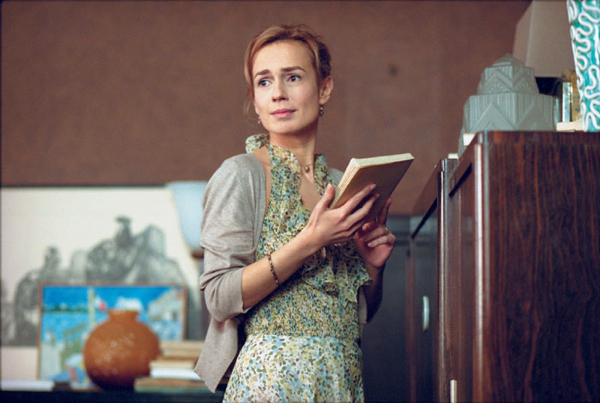Movie review by Greg Carlson
Patrice Leconte’s filmography is peppered with many excellent, entertaining movies, including “The Girl on the Bridge,” “Ridicule,” and “The Widow of Saint-Pierre.” His latest, “Intimate Strangers,” is not nearly as good as those three, but for patient audience members, it still manages to stimulate the senses in satisfying ways. Written by Jerome Tonnerre, “Intimate Strangers” operates like a stage play, with much of the action limited to the flat/office of William Faber, a lonely, middle-aged tax lawyer, played expertly by Fabrice Luchini. Despite the restricted venue, however, Leconte busies himself with the psychological motivations of his characters, and the result is a story that explores the boundaries of sexual paralysis and romantic trepidation.
William’s peaceful, dull routine is interrupted one day with the arrival of Anna (Sandrine Bonnaire), a troubled woman who begins to share intimate details about her marriage. Too flummoxed to interrupt, William realizes that Anna has made a mistake: she thinks he is the psychoanalyst whose office is down the hall. In a weaker film, this premise would have been enough to sustain a farcical comedy of errors in which the mistaken identity is only discovered in the final act. Leconte, however, is more interested in exploring the sorts of things that happen following the revelation of truth, so we are somewhat surprised when William tells Anna he is not a shrink, and she decides to continue seeing him anyway.
As Anna and William forge their bizarre relationship, Leconte nearly tires himself out trying to evoke the erotic tension found in so many of Hitchcock’s great films. “Intimate Strangers” lacks most of the high-stakes danger that propelled “Vertigo,” “North by Northwest,” and “Rear Window,” which makes William’s obsession with Anna more humdrum than it ought to be. The rather late arrival of Anna’s creepy husband delivers a jolt, but the movie would have been much stronger had Leconte pursued this angle in greater depth.
Leconte chooses coyness over disclosure, and the strategy works for some scenes but hampers others. To what degree is Anna manipulating William? Does William even suspect her of duplicity? The characters are often too opaque to enjoy, and the director seems content to keep his viewers in the dark too much of the time. Little clues suggest that William and Anna are greatly stimulated by their doctor-patient formality (a shot of William dancing to “In the Midnight Hour” is one of the movie’s comic highlights), but Leconte keeps the lust on a mighty short leash.
Most of the film’s supporting players exist to poke holes in William’s fantasy, but as signposts of reality, they also provide the audience with much-needed context. William’s former partner Jeanne (Anne Brochet) pops up often enough to scold him for his mind games with Anna. William’s secretary, Mrs. Mulon (Helene Surgere), is simply delightful as she shoots withering glances and mumbles bitter complaints under her breath. Dr. Monnier (Michel Duchaussoy), the real psychologist Anna intended to see in the first place, is suitably pompous and greedy. His interactions with William are clever and revealing. Despite an awkward ending, Leconte wants his viewers to leave the theatre with ideas to ponder. Whether one spends any time thinking about “Intimate Strangers” depends on how much joy can be found in material designed to conceal a cryptic agenda.
